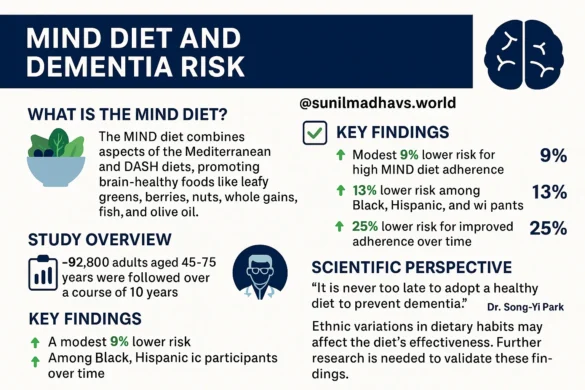A new analysis from a large, ethnically diverse population suggests that adhering to the MIND diet—a blend of the Mediterranean and DASH diets designed to protect the brain—may significantly reduce the risk of developing Alzheimer’s disease and other forms of dementia.
Study Details and Key Findings
At the 2025 NUTRITION conference in Orlando, researchers presented findings showing that the MIND diet was linked to a 9% to 25% reduced risk for Alzheimer’s disease and related dementias (ADRD). The Multiethnic Cohort Study, which followed 92,849 adults aged 45 to 75, found that people who most closely followed the MIND diet had better brain health outcomes.
- Over the study period, 21,478 cases of ADRD were identified.
- Those with the highest adherence to the diet showed a 9% lower risk of developing dementia compared to those with the lowest adherence (Hazard Ratio: 0.91; Confidence Interval: 0.87–0.96).
- Black, Hispanic, and white participants had an even more notable 13% reduced risk.
- The strongest protection was seen in individuals who significantly improved their diet over a decade, with a 25% reduction in dementia risk (HR: 0.75; CI: 0.69–0.82).
- These trends were consistent across age groups, suggesting mid-to-late-life dietary changes can still offer brain health benefits.
According to Dr. Song-Yi Park, associate professor at the University of Hawaii at Manoa, these findings reinforce the idea that it’s never too late to begin eating healthier to protect the brain.
Ethnic Differences in Diet Impact
Interestingly, the benefits were less evident in Asian American and Native Hawaiian participants, hinting that the MIND diet may not fully align with or reflect the protective qualities of traditional ethnic diets. Park emphasized the importance of understanding how cultural dietary patterns might interact with brain health, suggesting that personalized or culturally adapted dietary interventions may be more effective for some populations.
Supporting Research and Broader Context
This study builds on previous research linking the MIND diet to improved cognitive function and a lower risk of mental decline. Although this presentation was based on a conference abstract and not yet peer-reviewed, it strengthens the existing body of evidence suggesting that overall diet quality—rather than individual nutrients—plays a key role in preserving cognitive health.
Other healthy eating patterns such as the Mediterranean, DASH, and Nordic diets have also been associated with a slower rate of cognitive decline. These diets typically:
- Limit saturated fats and added sugars
- Prioritize vegetables, whole grains, fruits, and healthy fats
- Include region-specific beneficial foods, such as olive oil in Mediterranean cultures or fatty fish in Nordic regions.
The U.S. POINTER Study and Upcoming Insights
Complementing this research, the U.S. POINTER study—a two-year clinical trial led by the Alzheimer’s Association—is exploring whether combining healthy diet, physical activity, and other lifestyle interventions can protect cognitive function in older adults at high risk of mental decline. This is the first large-scale U.S. study of its kind in a racially and culturally diverse population, with results expected in July 2025 at the Alzheimer’s Association International Conference (AAIC).
Practical Implications and Public Engagement
As emphasized by Courtney Kloske, PhD, Director of Scientific Engagement at the Alzheimer’s Association, simple lifestyle changes—especially dietary improvements—can play a powerful role in maintaining brain health. The association promotes 10 Healthy Habits for Your Brain, which include balanced nutrition, physical activity, social engagement, and mental stimulation.
For those eager to learn more, the AAIC for All program offers free online access to highlights from the world’s largest dementia science conference, taking place July 31, 2025, in Toronto and virtually.
Funding and Disclosures
This study was funded by the National Cancer Institute and the National Institute on Aging. Dr. Park and co-investigators disclosed no conflicts of interest.

